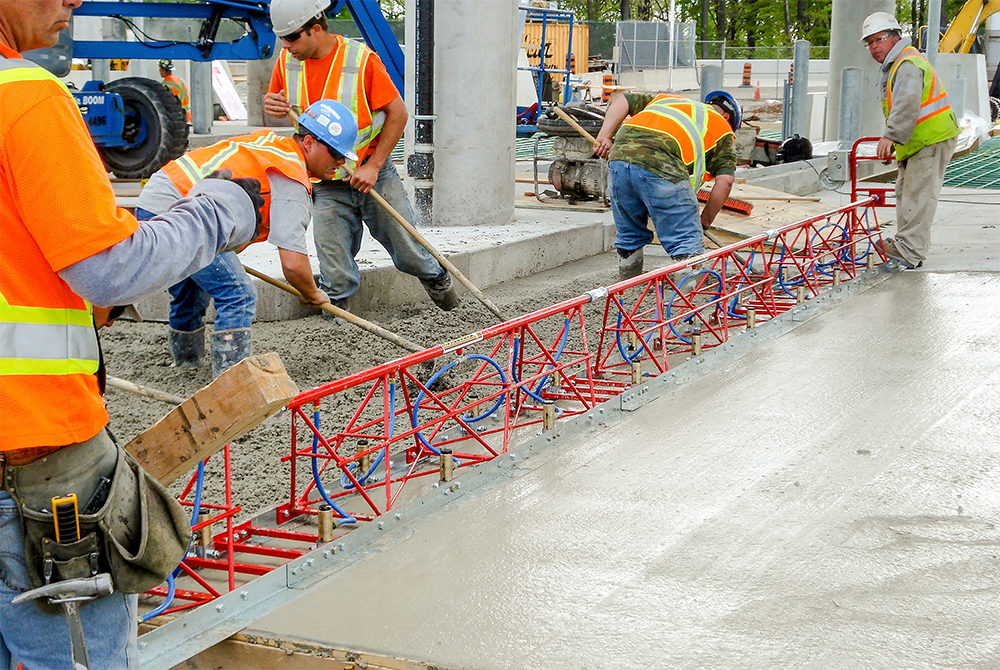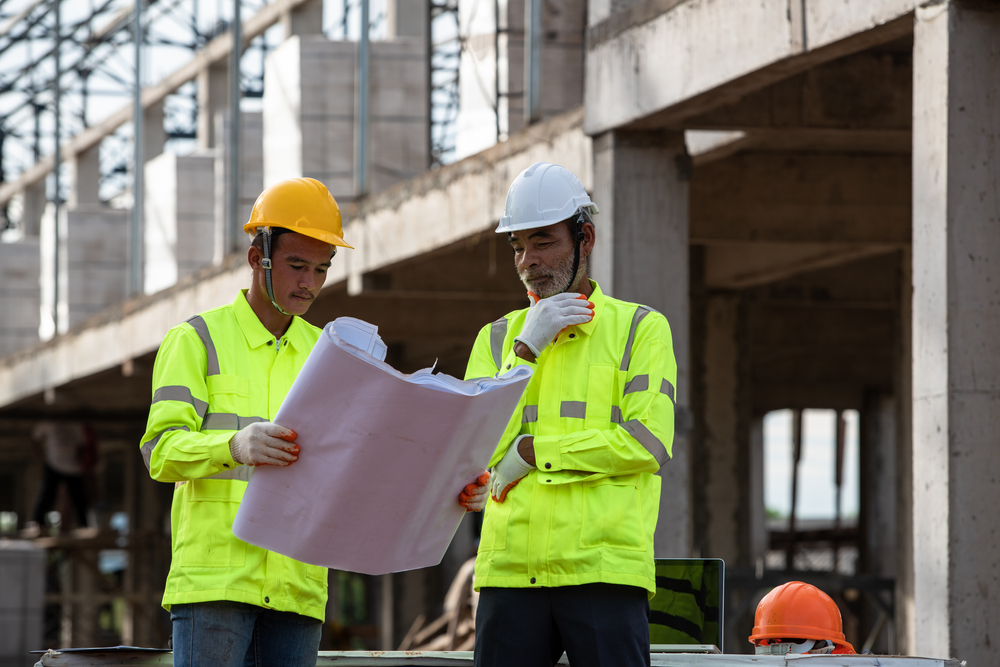The Necessary Duty of Concrete Foundation in Structural Honesty and Long Life
When it comes to constructing a residential property, the foundation is a lot more vital than you may assume. Concrete structures offer unequaled toughness and toughness, guaranteeing your structure can hold up against different ecological obstacles. Without a solid base, you run the risk of possible issues like shifting or fracturing, which can compromise safety and value. Recognizing the nuances of concrete foundations might be the key to preserving your financial investment for years ahead. What should you consider following?
Comprehending the Significance of Concrete Foundations
Concrete foundations are essential to the total stability of any kind of framework, as they supply the essential support needed to hold up against different tons and ecological problems. When you consider constructing a home or a commercial room, the foundation is the initial thing you should take into consideration. It works as an obstacle against wetness, protecting your residential or commercial property from water damages. A well-placed concrete foundation also prevents settling and moving, which can bring about fractures in walls and floorings. You'll intend to ensure that the foundation is properly designed and strengthened, as this affects the durability of your building. In addition, a strong structure can improve power effectiveness by minimizing air leaks. Bear in mind, disregarding the value of a concrete foundation can result in pricey repair services down the line. So, buying a top quality structure upfront is vital for the honesty and resilience of your framework.
Advantages of Concrete Structures for Structural Integrity
While numerous variables add to a building's architectural integrity, concrete structures provide unmatched longevity and strength. You'll appreciate that concrete can stand up to extreme climate condition, withstanding both dampness and temperature fluctuations. This resilience implies your framework is much less likely to experience splitting or shifting with time, which can compromise its safety.Additionally, concrete's inherent weight provides a solid base, protecting against activity during all-natural occasions like quakes or floods. When you choose a concrete foundation, you're likewise selecting low upkeep; unlike timber, it won't rot or draw in insects, conserving you time and money in repairs.Moreover, concrete's fire resistance offers included safety and security, ensuring your structure can endure heats without significant damage. In general, buying a concrete structure implies you're focusing on the long-term stability and integrity of your structure, making it a sensible choice for any construction project.
Typical Kinds of Concrete Foundations
When it concerns building structures, comprehending the usual types of concrete structures can assist you make notified selections for your project. One of the most prevalent types consist of slab-on-grade, crawl space, and complete basement foundations.A slab-on-grade structure is a straightforward, cost-efficient choice, where a thick concrete piece is put directly on the ground. This kind functions well in cozy climates, as it minimizes warmth loss.Crawl area foundations elevate the home somewhat above ground, allowing for air flow and access to pipes and electric systems. This layout can aid stop wetness issues.Full cellar foundations use added living or storage room while offering exceptional structural assistance. They need even more excavation and are generally utilized in cooler climates to avoid frost heave.
Factors to Take Into Consideration When Designing a Concrete Foundation

Ideal Practices for Setting Up Concrete Foundations
When you're setting up a concrete foundation, appropriate website preparation is vital to guarantee stability (WCGE commercial concrete). You'll additionally need to comprehend support strategies to improve strength and toughness. Do not ignore the curing procedure, as it plays an essential function in attaining a strong structure.
Site Prep Work Significance
It may appear simple, correct site prep work is essential for assuring a solid and resilient concrete foundation. Begin by clearing the location of any type of particles, plants, or natural product that can jeopardize the structure's stability. Next off, evaluate the dirt kind and compaction; you might require to excavate or add materials to create a steady base. Degree the ground to ensure even weight distribution and prevent settling issues in the future. Mounting appropriate drainage systems is additionally vital to prevent water accumulation, which can weaken the foundation gradually. Mark out the structure's dimensions accurately to assist the putting process. By adhering to these actions, you'll set the stage for a successful concrete foundation that stands the test of time.
Reinforcement Methods Clarified
As soon as the website is appropriately prepared, the following action in ensuring a strong concrete structure entails executing effective support strategies. You need to start by using steel rebar, which provides tensile toughness and helps prevent cracking. Lay the rebar in a grid pattern, ensuring it rises utilizing spacers to preserve correct protection. Additionally, take into consideration using wire mesh for additional assistance, particularly in areas based on hefty lots. Don't forget to link the rebar crossways securely with cable. For larger structures, fiber support can boost toughness, lowering the danger of shrinking splits. Constantly comply with local building ordinance and standards to make certain compliance. By applying these support techniques, you'll substantially boost your structure's toughness and durability, laying a solid foundation for your framework.
Treating Refine Basics
To assure your concrete foundation remedies correctly, it is necessary to keep appropriate moisture and temperature level conditions immediately after pouring. Beginning by covering the surface with a damp cloth or plastic sheet to retain moisture. This maintains the concrete moisturized, protecting against splits and ensuring toughness. You should additionally monitor the temperature; suitable curing problems are between 50 ° F and 90 ° F. If it's as well warm, mist the surface routinely to stop quick dissipation. For winter, think about using protecting blankets to maintain heat. Objective for a healing duration of at the very least 7 days, as this is vital for optimum strength development. By adhering to these ideal techniques, you'll enhance your structure's toughness and durability, guaranteeing architectural honesty for many years ahead.
Upkeep of Concrete Structures for Long Life
To keep your concrete structure solid and enduring, regular inspections are vital. You ought to additionally ensure efficient drain remedies remain in area to stop water damage. If you spot any type of cracks, addressing them without delay will save you from bigger problems down the line.

Normal Examinations and Assessments
While routine examinations and analyses may appear like a chore, they're essential for maintaining the stability of your concrete foundation. By routinely looking for cracks, changes, or signs of wear, you can capture potential concerns prior to they intensify into costly repair work. Search for any kind of water pooling around the foundation or uncommon settling, as these can signal underlying troubles. It's likewise important to monitor any type of modifications in your house's structure, like doors that stick or windows that don't open smoothly. Maintaining a record of your assessments assists track modifications with time, permitting proactive upkeep. Ultimately, these assessments ensure your structure continues to be stable, sustaining the durability and safety of your entire framework. Don't ignore this crucial element of homeownership!
Reliable Water Drainage Solutions
Routine inspections can disclose concerns like drainage issues that could endanger your concrete structure's stability. To stop water build-up, ensure your gutters and downspouts direct water away from the foundation. Installing French drains can efficiently redirect surface and groundwater, decreasing stress on your foundation wall surfaces. In addition, rating the soil around your home aids ensure that water moves away, instead of merging near your foundation.Consider utilizing sump pumps in locations prone to flooding, as they West Coast General Engineering Concrete actively remove excess water. Frequently look for obstructions in water drainage systems and clear them quickly. You'll protect your foundation's stability and longevity by taking these aggressive measures. Bear in mind, effective drainage services are crucial for maintaining a strong, durable concrete foundation.
Prompt Split Fixes
When you notice fractures in your concrete foundation, addressing them promptly is vital for keeping its long life. Tiny cracks can swiftly evolve right into larger problems, jeopardizing the architectural stability of your home. On a regular basis examine your foundation for signs of damage, such as straight or vertical splits. If you find any kind of, don't wait-- repair them quickly. You can make use of epoxy shots or concrete patching compounds, which work for sealing splits. Constantly follow the maker's directions and consider seeking advice from an expert for substantial damage. Remember, timely repairs not only boost your foundation's sturdiness however additionally save you cash over time by preventing more extensive repairs down the line. Remain positive, and your structure will remain solid and protected.
Attending To Typical Problems With Concrete Foundations
Concrete foundations can encounter numerous concerns gradually, making it critical to recognize and address them immediately. Among the most usual troubles is cracking, which can happen due to temperature fluctuations or resolving dirt. If you notice splits, it's necessary to analyze their size and depth; small cracks can usually be secured, while larger ones may need expert evaluation.Water breach is an additional significant worry. Excess wetness can cause mold and mildew development and architectural degeneration. Assurance appropriate water drainage around your structure to reduce this risk. Additionally, search for signs of shifting or bowing walls, as this can suggest underlying problems with your structure's stability.Regular assessments are essential to capture these issues early. If you detect any kind of concerning indicators, do not hesitate to seek advice from a structure expert. By staying aggressive, you can maintain the integrity and longevity of your concrete structure, ensuring your home remains safe and secure.
Often Asked Inquiries
How Does Soil Type Impact Concrete Foundation Efficiency?
Dirt kind significantly influences concrete structure efficiency. If you've got expansive clay, for example, it can trigger shifting and cracking. Sandy dirt might bring about resolving. Understanding your soil assists guarantee a steady structure.
Can Concrete Foundations Be Fixed if Harmed?
Yes, you can fix damaged concrete structures. Depending on the extent of the damage, techniques like epoxy injection or piece jacking can bring back security. It's finest to consult a professional for efficient services.
What Is the Common Life Expectancy of a Concrete Foundation?
A concrete structure normally lasts 30 to 100 years, depending upon elements like soil conditions, environment, and maintenance. You'll desire to watch on it to ensure it remains healthy throughout its life-span.
Are There Choice Materials to Concrete for Foundations?
Yes, there are alternatives to concrete for foundations, like steel, hardwood, or perhaps recycled products. Each option has one-of-a-kind advantages and drawbacks, so you must consider your project's certain needs when selecting the ideal product.
How Does Environment Effect Concrete Foundation Resilience?
Climate significantly affects concrete foundation longevity (West Coast General Engineering Concrete). Extreme temperatures, wetness, and freeze-thaw cycles can compromise the material, bring about splits and structural issues. You ought to take into consideration neighborhood climate conditions when intending your foundation to guarantee long-term efficiency